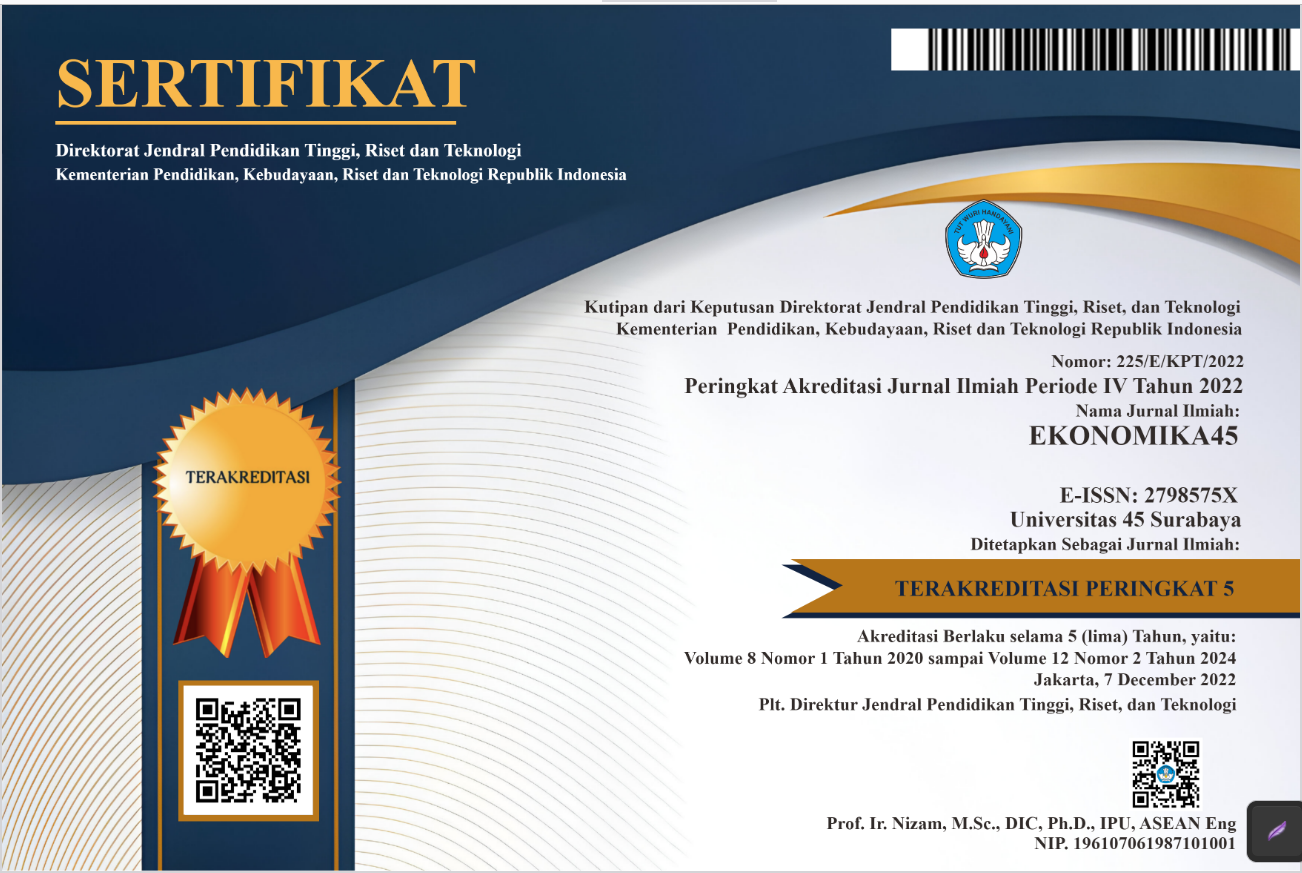Analisis Model Score (Stimulus, Capability, Collusion, Opportunity, Rationalization dan Ego) Terhadap Korupsi
Studi Pada Pemerintah Provinsi di Indonesia Tahun 2018-2022
DOI:
https://doi.org/10.30640/ekonomika45.v12i2.4546Keywords:
Corruption, SCCORE Model, Stimulus, Capability, CollusionAbstract
Corruption refers to an unlawful act that involves the misuse of authority to benefit an organization while causing harm to the state's economy. This research aims to examine the impact of stimulus, capability, collusion, opportunity, rationalization, and ego on corruption within provincial governments in Indonesia during the 2018-2022 period. The study population consists of all provinces in Indonesia. The sample selection was conducted using the purposive sampling method. Based on this approach, 34 provincial governments met the criteria for inclusion in the study. To test the hypotheses, this research employs IBM SPSS software version 26, utilizing the logistic regression analysis method. The findings indicate that, in part, capability and opportunity positively influence corruption, while rationalization and ego have a negative effect. Meanwhile, stimulus and collusion do not significantly impact corruption.
References
Achmad, T., et al. (2022). Hexagon fraud: Detection of fraudulent financial reporting in state-owned enterprises Indonesia. Economies, 10(13), 1–16. https://doi.org/10.3390/economies10010013
Anandya, D., & Ramdhana, K. (2024, May). Laporan hasil pemantauan tren korupsi tahun 2023. https://antikorupsi.org/sites/default/files/dokumen/Narasi%20Laporan%20Hasil%20Pemantauan%20Tren%20Korupsi%20Tahun%202023.pdf
Apriasanti, S. D., & Widajantie, T. D. (2022). Pengaruh opini audit dan temuan audit terhadap tingkat korupsi pemerintah daerah. JIMAT: Jurnal Ilmiah Mahasiswa Akuntansi, 13(2), 728–737. https://doi.org/10.29313/bcsa.v4i1.12454
Association of Certified Fraud Examiners Indonesia. (2020, May). Survei Fraud Indonesia 2019. https://acfe-indonesia.or.id/survei-fraud-indonesia/
Association of Certified Fraud Examiners. (2022). A report to the nations: Occupational fraud 2022 (pp. 1–96). https://www.acfe.com/-/media/files/acfe/pdfs/rttn/2022/2022-report-to-thenations.pdf
Chang, L., et al. (2023). Narcissistic CEOs, dynamic capability, and green innovation. Heliyon, 9, e18898. https://doi.org/10.1016/j.heliyon.2023.e18898
Christiawan, W. (2016). Analisa kasus korupsi pengadaan alat kesehatan di Provinsi Banten dan Kota Tangerang Selatan. Jurnal Akuntansi Bisnis, 16(28), 131–148. https://journal.unika.ac.id/index.php/jab/article/view/1340/827
Cressey, D. R. (1953). Other people’s money: A study in the social psychology of embezzlement.
Fitri, F., & Nadirsyah. (2020). Pengaruh tekanan, kesempatan, rasionalisasi, dan kapabilitas terhadap pengadaan barang/jasa di pemerintahan Aceh dengan pemoderasi budaya etis organisasi. JIMEKA: Jurnal Ilmiah Mahasiswa Ekonomi Akuntansi, 5(1), 69–84. https://jim.usk.ac.id/EKA/article/view/15437
Fuadi, I., & Mabrur, A. (2021). Faktor-faktor penentu korupsi pada pemerintah daerah di Indonesia. Indonesian Treasury Review: Jurnal Perbendaharaan, Keuangan Negara dan Kebijakan Publik, 6(4), 317–328. https://doi.org/10.33105/itrev.v6i4.410
Komisi Pemberantasan Korupsi (KPK). (2024). Tindak pidana korupsi berdasarkan profesi/jabatan. https://www.kpk.go.id/id/statistik/penindakan/tpk-berdasarkan-profesijabatan
Kristiawati, et al. (2019). Citra merek, persepsi harga, dan nilai pelanggan terhadap keputusan pembelian pada mini market Indomaret Lontar Surabaya. Jurnal Ilmu Ekonomi dan Manajemen (JMM 17), 6(2), 27–36.
Maria, E. (2019). Eksplorasi kesempatan untuk melakukan fraud di pemerintah daerah Indonesia. Jurnal Akuntansi dan Keuangan Indonesia, 16(1), 216–232. https://doi.org/10.21002/jaki.2019.01
Maria, E., et al. (2018). Eksplorasi faktor tekanan untuk melakukan fraud di pemerintah daerah di Indonesia. Jurnal Akuntansi Publik, 1(1), 111–126. https://doi.org/10.21002/jaki.2019.01
Maria, E., et al. (2019). Desentralisasi fiskal dan probabilitas terjadinya korupsi: Sebuah bukti empiris dari Indonesia. Jurnal Ekonomi dan Bisnis, 22(1), 1–22. https://doi.org/10.24914/jeb.v22i1.2036
Marks, J. (2012). The mind behind the fraudster’s crime: Key behavioral and environmental elements. https://www.crowe.com/
Meyer, M. N., et al. (2023). Wrestling with social and behavioral genomics: The ethical implications of social and behavioral genomics. Hastings Center Report, 53(2), 2–49. https://doi.org/10.1002/hast.1477
Muhtar, et al. (2018). Corruption in Indonesian local government: Study on triangle fraud theory. International Journal of Business and Society, 19(2), 536–552. https://myjurnal.mohe.gov.my/public/article-view.php?id=125114
Nuruddina, M., & Rahmawati, I. P. (2021). Fraud triangle dan korupsi pada pemerintah daerah di Indonesia. JRAK: Jurnal Riset Akuntansi dan Komputerisasi Akuntansi, 12(1), 110–124. http://jurnal.unismabekasi.ac.id/
Rottweiler, B., & Gill, P. (2022). Individual differences in personality moderate the effects of perceived group deprivation on violent extremism: Evidence from a United Kingdom nationally representative survey. Frontiers in Psychology, 13, 790770. https://doi.org/10.3389/fpsyg.2022.790770
Sholeh, A., et al. (2024). Kompensasi terhadap motivasi kerja karyawan pada PT. Insolent Raya di Surabaya. Journal of Management and Creative Business, 2(1), 82–96.
Sugiyono. (2023). Metode penelitian kuantitatif, kualitatif, dan R&D. CV Alfabeta.
Utami, D. P. W., & Purnamasari, D. I. (2021). The impact of ethics and fraud pentagon theory on academic fraud behavior. Journal of Business and Information Systems, 3(1), 49–59. https://doi.org/10.36067/jbis.v3i1.88
Vousinas, G. L. (2019). Advancing theory of fraud: The S.C.O.R.E. model. Journal of Financial Crime, 26(1), 372–381. https://doi.org/10.1108/JFC-12-2017-0128
Wicaksono, G. S., & Prabowo, T. J. W. (2022). Analisis faktor-faktor yang mempengaruhi korupsi pada pemerintah daerah di Jawa Tengah menggunakan teori fraud triangle. Owner: Riset dan Jurnal Akuntansi, 6(1), 1016–1028. https://doi.org/10.33395/owner.v6i1.710
Wolfe, D. T., & Hermanson, D. R. (2004). The fraud diamond: Considering the four elements of fraud. The CPA Journal, 74(12), 38–42. https://digitalcommons.kennesaw.edu/facpubs/1537/
Yuniarti, R. D., & Linuhung, T. S. (2023). Analysis of factors that influence the occurrence of corruption in the perspective of fraud hexagon. Britain International of Humanities and Social Sciences (BIoHS) Journal, 5(2), 152–163. https://doi.org/10.33258/biohs.v5i2.988
Downloads
Published
How to Cite
Issue
Section
License
Copyright (c) 2025 EKONOMIKA45 : Jurnal Ilmiah Manajemen, Ekonomi Bisnis, Kewirausahaan

This work is licensed under a Creative Commons Attribution-ShareAlike 4.0 International License.









